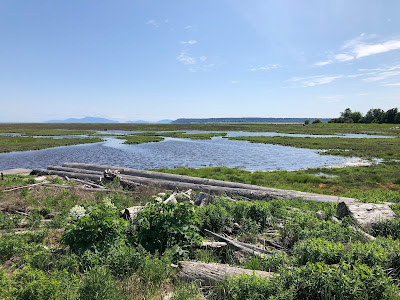One of the key documents that the Metro Vancouver Regional District is responsible for is the Regional Growth Strategy. This document aligns our region’s 21 municipalities and Tsawwassen First Nation Official Community Plans with the provincial mandate “to promote human settlement that is socially, economically and environmentally healthy.”
The currently Regional Growth Strategy, Metro 2040, is under-review as work is proceeding on Metro 2050 which is the next version of the Regional Growth Strategy. One of the areas that is under review is the environmental protection policies in Metro 2040.
Between 2009 and 2014, 1,640 hectares of sensitive and modified ecosystems where lost. Some example of why they were lost include for agricultural uses, logging, and residential development. With this is mind, the regional district is exploring ways to build stronger business cases, policies, and tools to better protect these ecosystems.
The regional district held a forum this summer between policy experts and government as part of the Metro 2040 Environment Policy Review to find ways to plug gaps in current regional environmental policies. The following items were explored:
Improve how we protect our ecologically important areas in our region
- Implement additional mechanisms to protect, enhance, and connect sensitive ecosystems.
- Create tools that help place a value on ecosystem services provided by ecologically important areas and include in municipal accounting.
- Improve information about ecosystem services (including health and economic benefits).
- Apply consistent policies and approaches across the region.
Explore biodiversity-led regional green infrastructure
- Develop a common definition of green infrastructure noting the co-benefits for both wildlife and people.
- Strengthen biodiversity and green infrastructure policies at the regional level.
- Create a pilot project on biodiversity-led regional green infrastructure.
- Develop funding and implementation tools for green infrastructure to support projects at a regional and local scale.
Link green space in urban areas to human health.
- Increase the priority of green space in urban areas (especially new development areas).
- Coordinate work between local governments and health authorities on green space and human health.
- Rank public green space and health levels across the region.
- Set green space targets for municipalities to meet or exceed, require reporting.
- Develop best practices to optimize health and ecological benefits of green spaces.
- Increase awareness about the benefits of green space in urban areas.
More details about these three focus areas can be found in the latest Regional Planning Committee Agenda. They will help inform the updated Metro 2050 Regional Growth Strategy which will hopefully further help creating an healthier region.


No comments:
Post a Comment